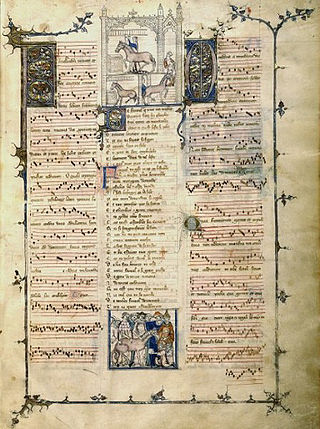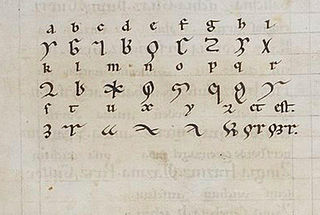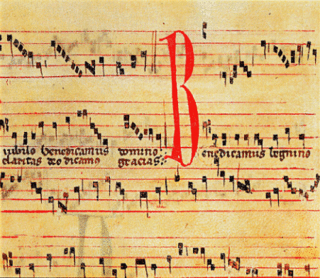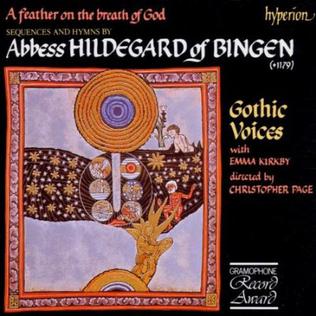
Hildegard of Bingen, also known as Saint Hildegard and the Sibyl of the Rhine, was a German Benedictine abbess and polymath active as a writer, composer, philosopher, mystic, visionary, and as a medical writer and practitioner during the High Middle Ages. She is one of the best-known composers of sacred monophony, as well as the most recorded in modern history. She has been considered by scholars to be the founder of scientific natural history in Germany.
Plainsong or plainchant is a body of chants used in the liturgies of the Western Church. When referring to the term plainsong, it is those sacred pieces that are composed in Latin text. Plainsong was the exclusive form of Christian church music until the ninth century, and the introduction of polyphony.

Ars nova refers to a musical style which flourished in the Kingdom of France and its surroundings during the Late Middle Ages. More particularly, it refers to the period between the preparation of the Roman de Fauvel (1310s) and the death of composer Guillaume de Machaut in 1377. The term is sometimes used more generally to refer to all European polyphonic music of the fourteenth century. For instance, the term "Italian ars nova" is sometimes used to denote the music of Francesco Landini and his compatriots, although Trecento music is the more common term for the contemporary 14th-century music in Italy. The "ars" in "ars nova" can be read as "technique", or "style". The term was first used in two musical treatises, titled Ars novae musicae by Johannes de Muris, and a collection of writings attributed to Philippe de Vitry often simply called "Ars nova" today. Musicologist Johannes Wolf first applied to the term as description of an entire era in 1904.
Benjamin Bagby is an American singer, composer, harpist, and performer of medieval music.
A sequence is a chant or hymn sung or recited during the liturgical celebration of the Eucharist for many Christian denominations, before the proclamation of the Gospel. By the time of the Council of Trent (1543–1563) there were sequences for many feasts in the Church's year.

A lingua ignota was described by the 12th-century abbess Hildegard of Bingen, who apparently used it for mystical purposes. It consists of vocabulary with no known grammar; the only known text is individual words embedded in Latin. To write it, Hildegard used an alphabet of 23 letters denominated litterae ignotae.
Sequentia is an early music ensemble, founded in 1977 by Benjamin Bagby and Barbara Thornton. The group specializes mainly in Medieval music. Sequentia focuses particularly on music with texts, specifically chants and other stories with music, such as the Icelandic Edda. They are interested in the interplay between drama and music, and sometimes do partially staged performances, such as that of Hildegard of Bingen's Ordo Virtutum. Bagby and Thornton have both been active in original research on the projects they perform.

Eibingen Abbey is a community of Benedictine nuns in Eibingen near Rüdesheim in Hesse, Germany. Founded by Hildegard of Bingen in 1165, it was dissolved in 1804, but restored, with new buildings, in 1904. The nuns produce wine and crafts. They sing regular services, which have been at times recorded. The church is also used as a concert venue. The abbey is a Rhine Gorge World Heritage Site.
Ordo Virtutum is an allegorical morality play, or sacred music drama, by Hildegard of Bingen, composed c. 1151, during the construction and relocation of her Abbey at Rupertsberg. It is the earliest morality play by more than a century, and the only medieval musical drama to survive with an attribution for both text and music.

The Codex Las Huelgas is a music manuscript or codex from c. 1300 which originated in and has remained in the Cistercian convent of Santa María la Real de Las Huelgas in Burgos, in northern Spain. The convent was a wealthy one which had connections with the royal family of Castile.
Rainbow Body is an orchestral composition by the American composer Christopher Theofanidis. It was commissioned by the Houston Symphony, which first performed the work in April 2000 under the conductor Robert Spano. The piece is dedicated to the Texas lawyer and philanthropist Glen Rosenbaum. Rainbow Body is one of Theofanidis's most-performed compositions and won the 2003 London Masterprize competition.
Barbara Thornton was an American singer, musicologist, and groundbreaking performer of medieval music.

This is a discography of Hildegard of Bingen's musical works.
Alba are a Danish medieval music ensemble founded in 1992. The ensemble consists of the duo Agnethe Christensen and Poul Høxbro, or the trio with the harpist Helen Davis.
The Ensemble für frühe Musik Augsburg is a German early music ensemble founded in 1977 and specializing in medieval music. The ensemble is regarded as "renowned" in Germany.

A Feather on the Breath of God is an album of sacred vocal music written in the 12th century by the German abbess Hildegard of Bingen, and recorded by British vocal ensemble Gothic Voices with English soprano Emma Kirkby. It was released by the Hyperion Records label in 1982.

Barbara Stühlmeyer OblOSB is a German theologian, musicologist, author, especially a Hildegard scholar and a science journalism.

The Dendermonde Codex or sometimes called Villarenser Kodex or codex 9 of Dendermonde Abbey, is a valuable manuscript containing the Symphonia harmoniae caelestium revelationum of Hildegard of Bingen.

The Oxford Camerata is an English chamber choir based in Oxford, England. The Camerata was founded in 1984 by conductor Jeremy Summerly and singers David Hurley and Henrietta Cowling and gave its first performance on 22 May of that year. The ensemble consists of a core membership of fifteen singers, though personnel size varies according to the demands of the repertoire. While the Camerata is known for performing primarily unaccompanied repertoire, it has also performed accompanied repertoire, employing the services of the Oxford Camerata Instrumental Ensemble and the Oxford Camerata Baroque Orchestra.
In the Green is a one-act musical with a book, music, and lyrics by Grace McLean. The show tells the story of medieval composer, mystic, scientist, and Catholic saint Hildegard von Bingen “on her path to sainthood from childhood,” primarily depicting the thirty years she spent locked up in a cell with her mentor, the anchoress Jutta von Sponheim.










